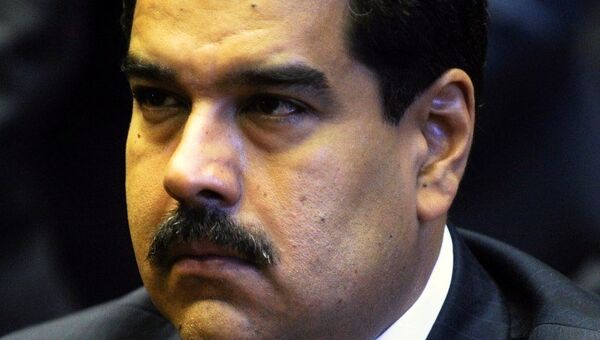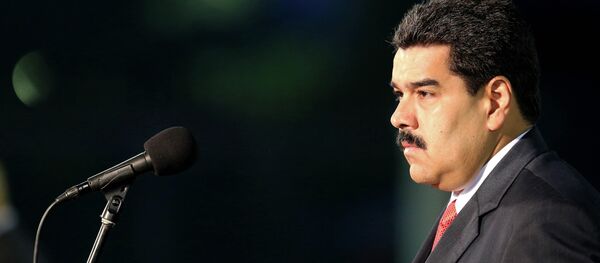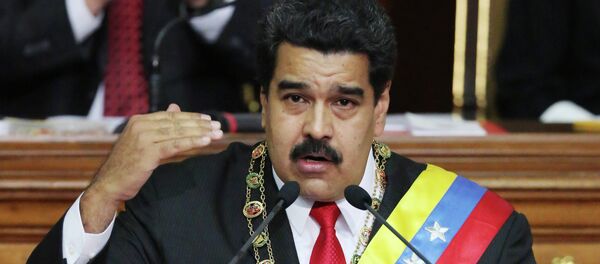Maduro became president after the 2013 death of iconic leader Hugo Chavez. While Chavez’s rule was marked with high prices for oil, necessary to keep the economy of the oil-producing Venezuela afloat and widely used to support the poorest and most vulnerable members of society, Maduro's years in power have been hampered by turbulence on the global oil market that devastated Venezuela’s economy.
Venezuela’s right-wing political forces have attempted several strategies since 1998 to remove the president, Montero explained, including an unsuccessful coup in 2002 to oust Chavez.
Opposition in the country’s National Assembly reformed after a period of fragmentation and created the Democratic Unit Roundtable (MUD), headed by Henrique Capriles, but was defeated by Chavez in 2012, and again by Maduro in 2013.
MUD then divided into "doves and hawks," with Leopoldo Lopez heading the "hard and violent opposition," and Capriles, who has been leading calls for dialogue, the professor said.
After elections in 2015, the National Assembly’s composition changed and a new plan began to unfold.
"First, the opposition tried to activate a recall referendum, that is an institutional tool provided by the Bolivarian Constitution that allows the people to plebiscite the continuity of the president’s mandate," Montero said.
He explained that the National Assembly then activated the recall referendum after the second half of Maduro’s mandate, which would mean that if the recall would have been successful, the country’s vice president, Aristobulo Isturiz, who has served high-profile posts in both Chavez and Maduro’s offices, would continue the current president’s mandate until 2019.
After the National Assembly understood the recall referendum would leave the political situation unchanged, the opposition decided to attempt a "Brazilian solution."
Unlike other countries in Latin America, such as Brazil, where Dilma Rousseff was removed from the presidency in August of this year, Venezuela’s National Assembly does not have the legal right to impeach the president as this power lies with the Supreme Court. The Court is dominated by leftists loyal to Maduro, so it has never voted against him, Montero explained.
Besides, not only the judiciary is on the current Venezuelan leader's side, but also the army.
Montero holds the opinion that sees no military coup, saying that "although the right-wing opposition has tried to seduce some officials in the past, the Bolivarian Forces seem still strongly united and not willing to take power."
The University of Buenos Aires professor also emphasized that there are important differences between Brazil and Venezuela’s scenarios of overthrowing the leaders.
The first major difference is in the number of opposition deputies in the Venezuelan National Assembly holding only 55 of the 159 seats. The second difference is in the line of succession should Maduro be ousted.
"In Brazil, the first, second, and third in line were members of the PMDB [the Brazilian Democratic Movement Party], the party that broke the alliance with Dilma [Rousseff] and led the impeachment…things are completely different in Venezuela and there are no visible signs of a significant breach within the ‘chavismo,’" Montero said.
Montero said that Latin America is now facing a "turning point" where political cycles are becoming questionable and undefined, while at the same time promoting neoconservative changes.
"From the perspective we try to retrace, however, the situation is analyzed as part of the hegemonic dispute process, facing now a ‘turning point’ in which continuity of the political cycle appears questionable, but not defined, before the transfer of the international crisis to emerging countries, global progress of integration of free trade type, and of Right Forces in key countries of the region, who have managed to articulate the emergence of new demands within the popular field to promote a program of ‘neo-conservative’ changes,” Montero explained.
The Argentinian political science specialist added that in the context of this turning point, new kinds of coups are most likely to take place.
Pomona College Professor of Latin American History Miguel Tinker Salas told Sputnik that the Venezuelan National Assembly will continue their efforts to oust Maduro.
Salas, who is also the author of the book "Venezuela, What Everyone Needs to Know," again emphasized that the Venezuelan Constitution does not include an impeachment provision, but does have a recall mechanism.
The Venezuelan Electoral Council initiated this mechanism, but it was halted by a court decision, the Californian professor said.
According to Salas, the recall process involves three steps that included the collection of 1 percent of the electorate that would trigger the process. Once this number is verified, the opposition would need to collect the signatures of 20 percent of the electorate, which would need to be certified by the National Electoral Commission.
"And finally, in an actual recall, the opposition would have to received more votes than Maduro did in the last election in order to unseat him," Salas explained.
"This scenario is unpalatable for the opposition, and they continue to promote street actions hoping to create conditions of ungovernability and force Maduro to resign," Salas said.
Salas believes the only way out of the political gridlock in Venezuela is dialogue.
"The only way out for Venezuela is a national dialogue, which was initiated with assistance from the Office of the Pope and the Union of South American Nations," Salas summarized.





